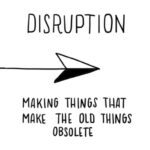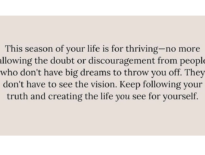
We have a huge problem in the startup ecosystem; that’s that most founders have been misled by a lot of people to think in terms of Problem / Solution. That a solution to a problem is what matters foremost in a startup. And that has led to the notion that validation is a simple matter of talking to, or getting, customers for a solution to a problem – prove people will pay for your solution, and you’re set!
This drives an incredible amount of waste as founders build MVPs prematurely, focus on customers inappropriately, or take advice from investors merely because a check is dangled, and they need the money to deliver the product.
Consider, has the average rate of startup success meaningfully changed in the last 25 years of the internet era of entrepreneurship?
For as long as I can remember, we’ve been saying that about 90% of all startups fail. And I won’t try to cite if that’s actually correct or accurate; because it doesn’t matter, the conventional wisdom hasn’t changed. All these books and yet no meaningful change. Teaching entrepreneurship in schools and the rate is the same.
I refer specifically to the internet era of entrepreneurship because it’s within that that we have FREELY available knowledge, massive datasets in evidence, and immediate connection and communication to essentially everyone – one can expect that from that, we can expect a MUCH higher rate of startup success because we KNOW what causes failure as well as what creates value.
A solution to a problem is NOT a competitive, scalable company. A company that is competitive and scalable, *creates* value.
EVERY mentor, investor, and advisor out there should be preaching what creates value and how; that’s evident to drive startup success – and that not being done well, or consistently, is what continues to mislead founders and result in an exceptionally high rate of failure.
And indeed, you can have ideas that solve problems but *don’t* create value. This happens all the time with would-be founders who invest a ton of their time and resources to try starting something, but ultimately give up because their effort isn’t valued enough that they succeed. What you need to watch our for and avoid are the people (on your team), advisors trying to help, and investors, who offer ideas that might solve problems, seeming to help, but fail to actually create value. Founders you MUST challenge advice and ideas because good ideas will kill you; you need great ideas that create value.
How to Challenge Good Ideas From Others Trying To Help (and believing they are):
- Someone on the team:
- “That’s a wonderful idea, do it. Put it in place and let’s see.”
- The idea itself is merely that and if anyone’s ideas were correct, in a startup, they’d not be offering ideas — they’d be capitalizing on their certain brilliance and amassing great amounts of wealth. DO IT.
- An advisor with an opinion:
- “Thank you so much for that direction. Show me how.”
- At the VERY least, someone who claims to know what you should do, should themselves absolutely have experience with doing it, and knowing it should work. Advisors don’t WORK for you, so asking them to do it isn’t as appropriate, but you can ask them to put their experience and certainty to work by showing you how so you that you can do it rather than having to now figure it out on your dime.
- An investor dangling a check:
- “Brilliant, thank you. To do that, we’d not need nearly as much capital so let’s put together a term sheet for the capital we’d need to do what you advise.”
- I explicitly added, ‘dangling a check’ in this case because far too many founders consider investor advise more credible or valid because they have wealth, they have success, and they’re implying they’ll invest if you heed that advice. Certainly, a plausible reason to take their advice… but like people on your team who are full of suggestions but no action, if their advice was always right, they wouldn’t be giving you advice, they’d be doing it. Avoid the dangling check by accepting the terms – “Since you think we’ll be more successful if we do that, we’ll do that and be successful.”
- You’re NOT trying to catch an investor in a gotcha! You’re validating the merit of the advice, challenging it, so that you don’t waste your time on bad advice, mere good ideas, or misdirection. IF the idea is GREAT, it creates value and value correlates to CASH; unless… they don’t think their advice is great.
I want to take a moment to caveat one more time what might sound like criticism of investors, because I referred to dangling a check or implied that their advice is bad. I’m NOT being critical, I’m advising you to be diligent. The best advice I’ve heard about fundraising is to “Ask for advice;” that, if you want to raise money, ask for advice, and if you want advice, ask for funding. So obviously, you’re asking for and going to get advice from investors – don’t let the idea of funding lead you to believe that it’s valid advice. Push back.
What’s valid in modern startup development is that you DO have to solve a problem; but you can’t consider that sufficient because it must be a solution that’s needed, competitive, sustainable, and valued.
What creates value? Peter Drucker noted, I’m paraphrasing, “Only two things create value in business, innovation and marketing, everything else is a cost, and marketing is the distinguishing of the two.”
– circa 1970s and largely abandoned in teaching and methodologies since the internet.
Create value, or you’re likely wasting your time.





What indicators exist that startups can use to identify how potential customers are in need of or are seeking value creation?
Loosely, what we teach:
1. Talk to hundreds of people, not customers. If they don’t understand and don’t see value, no one else will. People don’t need to be customers to appreciate value.
2. Make sure your team and advisors have direct experience in what you are doing – not just skillsets and certainly not “startups” or “tech” – explicitly what you are doing! Experience in the sector tends to know more than customers
3. Now, build evidence before building any solution: a newsletter, a community, a website with articles and white papers that keeps getting more and more traffic – prove that value CAN manifest because you’re capable of delivering something people are seeking.
4. Test that people will pay for it. Letters of Intent. A registration page with a payment processs (that isn’t yet enabled). Get INTENT to pay for it that is greater than saying they will.
They all need a board of mentors and all major decisions get hashed out by business leaders that have already gone through major pain before
In my opinion, to create real value, founders need a long-term vision, creating not just products or services that solve problems but also sustainable and evolving business models that continuously create and deliver value to customers. That means deep understanding of the market, competition, processes for continuous innovation, etc. Easier said than done
No question in my mind that you’re right and I entirely agree. I spend the first two office hours with our founds in our incubators trying to get them fixated on WHY THEM? Why do you care?
If I’m not convinced that you are passionate about this to such an extent that your mission is merely to do it, to improve the way things work, by every means necessary, then I’m not buying that you’re going to build a successful venture, because you want to and have an idea.
I want to discuss this later
Well said.
Such a good question! Would love to attend a Linkedin audio event on this topic. Hint hint
If I had a dime for every time someone suggested I get on the air and talk about this stuff… I’d have sponsorship to capably and meaningfully produce it
Also hint hint
Paul O’Brien I hear you. I am pumping the Linkedin event MAINLY because there is an option for Q&A, whereas podcasts are just a one way conversation. I’ll keep my eyes peeled..
Great post! Most accelerators and pitch deck advice emphasize the idea that founders must spell out a problem that is being solved. Game companies create enormous value. What problem do games like FortNite solve? Spelling out the opportunity to create lots of value instead makes sense.
Not only does spelling out the opportunity make more sense as it establishes value being created, but I want to comment on the game specific point of view.
A game is a production, not a company. A game is a product, not a solution. A game, like a music album, or a film, isn’t a startup. These things absolutely do NOT get funded in the same way as startups creating value by developing innovative solutions.
A film production platform is an innovation, a product, a solution, and a startup, funded by Angels and VCs (if appropriate). But a FILM is funded by *different* sources of capital – VCs don’t fund films and while the point you made is the same (will the film create value), the investor is not. MediaTech Ventures gets a LOT of inquiries from artists and creators seeking funding for a production and society is failing to capably teach people that productions != companies, startups, or solutions -> they’re a creative work that might be in demand and valued, but VCs don’t fund creative works.
A game “startup” is a new ad platform, a tech stack, a production suite, or new hardware, etc. A game is the result of those things existing.
—
Let me add though, given the nuance…
Fortnite isn’t just a game, it is a platform
Yes to this 100%! We’ve been told and sold “hair-on-fire problem / solution” BUT what hair on fire problem did Apple solve with the iPod / iPhone / iPad / Apple Watch, etc.? Did Facebook solve a hair on fire problem? Instagram? How about ChatGPT? AirBnB? Uber? Or, on the B2B side of things, Slack? Fact is, we all got along just fine without them, and then when they arrived, we thought, “This is so cool!” and then we had to have them. That’s creating value.
Hang on though, break the Apple iPod, iPhone, etc. from Apple the startup starting out.
What problem did Apple solve starting out such that they were fundable? They made computer hardware more affordable, interoperable, and DIY
Just like considering if Apple and Dell were actually competitors or not. Yes… sort of, but not really, because Dell was actually in the supply chain and purchasing sector while Apple was building the more proprietary technology model. Both solved problems but they solved problems that were valued,
The Problem Solution statement is valid, what I’m trying to impress upon people is that merely solving a problem isn’t a company, or fundable startup.
Did the others actually solve a problem? Yes
* Facebook – free connection and communication to nearly everyone
It was POSSIBLE before, but not working well
* Instagram – Flickr photo sharing for the smartphone era
Also, done before, sort of, but the problem wasn’t compelling on smartphones until Instagram came along
* ChatGPT – people don’t know how to “Google it” OR it takes hours to research and draft and article
*AirBnB – homes sitting empty are missed opportunities to make money
You get the idea. Then we can weigh back in how COMPANIES innovate and ask the Apple question again, because how Apple developed and released iPod, iPhone, etc. aren’t STARTUP stage products – they’re a company release new products
And if anything, Apple is PROOF of the point observed by Drucker. We had smartphones. We had music players.
Apple did Innovation and Marketing better, above all else, and defined the category.
—
We do get along just fine without innovations. Absolutely.
This is why the Product led startups (or product focused founders) tend to fail. It’s not the product that creates the value, the product is merely a solution to a problem. If the marketing fails it, and doesn’t lead the way in telling you how to develop a product that is priced right, demanded, desired, known, and valued, you have nothing. And you certainly can’t be innovative if you aren’t studying the market to know how you might create value by doing something differently.
I think you are absolutely right. Value is the outcome of emotional reflection of the solution which matters as it originates from problem but problem has so many reflection which projects as different values and sub problems from different angles. All these effort of guided information to generalize the disruption is misleading because the equation is complex. Lack of reality appears as fake reflection of solution and only locked down to simple judgements of human investors’ bias. Lastly, real story is never explained because most of the ecosystem is not a real ecosystem with knowledge flow, their trial to build up trust on no failure based polished stories creates oceangate like results and i have never seen some people who fund these projects as they made a mistake to throw money without clear and redundant outcome until the failure is so much visible all the world and can not be ignored. In these books i have never seen investors suggest to speak about failure investments but chapters like how to convince investors. I am sorry but whole system is not exists in my view. What is exists and real is only the customer who is in pain and inventors who knows how to relieve it. Other parties are so distracted from everything else.
I would love to see the initial problem slide Facebook presented. Maybe, it hard to find a date?
Rick Tett agree. Now granted, my observation has nothing to do with implying THEY knew it and that was the pitch. But rather that we can see in hindsight that that’s why it worked.
Great post
Paul O’Brien Fascinating read. Thank you for sharing.
It’s interesting to question whether the focus on problem/solution thinking in the startup ecosystem has truly led to meaningful change in success rates. Perhaps there should be a shift towards creating real value, instead of merely offering solutions. How can founders, advisors, and investors foster a culture that priorit value creation?
Yes! Precisely what I’m exploring here. Any thoughts on how to foster that focus on value creation?
My foremost thought is that “something customers will pay for” is actually wrong and insufficient. Most founders spend time on solutions that someone will pay for, or that they can at least capably sell to someone; creating that evidence that *someone* will pay for it… And yet, the overwhelming majority still fail.
Customer adoption is misleading.
I always thought it was “a solution to a problem that customers will pay for”. Not sure where that last part got dropped.
Gregg Hansen You sure? You’re not wrong in that many people add that but if you dig through almost all the articles and mentions of Problem / Solution Statement, they’re consistent, that it’s a one-sentence summary of the problem your startup solves and how your solution addresses it.
I took some time today digging through Google and startup sites since your perspective gave me pause and I wanted to confirm my experience. I can’t find much of anything prominent that says it’s only about what customers will pay for.
In fairness, yes, many people do add that and point it out to founders, but even that is why I wrote this article; countless startups (and hell, established companies) fail despite having customers. Customers are misleading indicators of validation and having them don’t prevent failure.
Moreover, VALUE is often destroyed through customers, not created. Some examples that come to mind:
* Launching prematurely and getting detractors because your solution isn’t right. Customers are paying for it but you’re not creating value
* You solution is worse than competitors provide. Customers paying you for it are effectively drawing from alternatives that create greater value, destroying the value that could be created there
* You target the wrong customers. They’re paying but the lead time, acquisition process, or different decision maker, means your venture is killing itself slowly focused on the wrong people
* Your product disregards something happening in the market that will prevent, compete with, or make irrelevant what you’re building. Great, you have paying customers, and wasted your resources starting a venture that can’t succeed – all that value wasted therein.
Problem/solution isn’t quite it, I agree. Creating value isn’t enough. You not only have to create enough value, you have to capture enough value. Your idea (and industry you choose) matters somewhat, but really your business model idea is what’s most important in terms of ideas down the road for sustainability.
There’s a lot of X factors. I think what’s important is to put a group together and see what happens. Reasonable ideas, reasonable people, hard work. Good things can happen. Unreasonable ideas, unreasonable people, and the hard work won’t make it happen. People act like they got it figured out – they don’t. Too many X factors, so you can never really say with any startup this is it, or this isn’t it (assuming the founders are even somewhat sensible).
The huge problem in the startup ecosystem is that it’s never been easier to start a company, and it’s never been harder to innovate. So, it seems everyone with an idea wants to be a founder, and most are pathetically unprepared let alone qualified to be a successful one.
Seeing no meaningful change in startup success rates is not due to terminology, methodology, philosophy or paradigm.
It’s a simple matter of building something the market wants, needs and will pay for. It matters not whether it solves a problem or if it’s completely disruptive to status quo and creates opportunity, it only matters that the market wants it – and it doesn’t matter nearly as much how or why.
Established statistics that have persisted through several massive economic cycles and shifts dictate maybe a 10% chance to scale and have a meaningfully substantial outcome. Debating the why is borderline pointless – it’s just the way the venture model works.
Many paths for a startup to get there, and no one size fits all. Experiment early, move fast, make smart decisions, and above all pay attention to the market and the customer.
What a founder thinks about their product means absolutely dick – only the opinion and action of the market counts when the rubber hits the road.
I got interest rate issues on asset valuations.
Seasoned investors have an ROI they see from prior investments.
You have to beat a treasury note if you want to raise money.
Let me repeat that again.
I need more than 1.0525 return on my money yearly before I cut you a check.
In a fund, you are a write off in a gamble, however, everyone’s hands are now being played and discounted by 50% destroying investor mindset.
We live in Texas, our greatest Entrepreneurs are Dell and Cuban, both are public and private about valuations, both have revenue.
Make money, don’t just take money.
Disruption via business model is still a fruiting plant, you can do things for less cost than what previous enterprises have endeavored to do.
Both Dell and Cuban agree, revenue is king if you are a startup looking for investors and seeking a valuation.
Wrong answers all around. The strategy is to be at the vanguard of Industry 4.0. It is coming too fast to learn what the market is, what it needs, and the market proposition unless you pick the right Industry 4.0 technologies at the get go. Current players have that knowledge while you are still discovering it. Some of your open-minded current players are already positioned to evaluate and respond to the breakthrough technology of this new age. To win the trophy you need to come out of the blocks ahead and leave the hobbled behind to take them on!!!